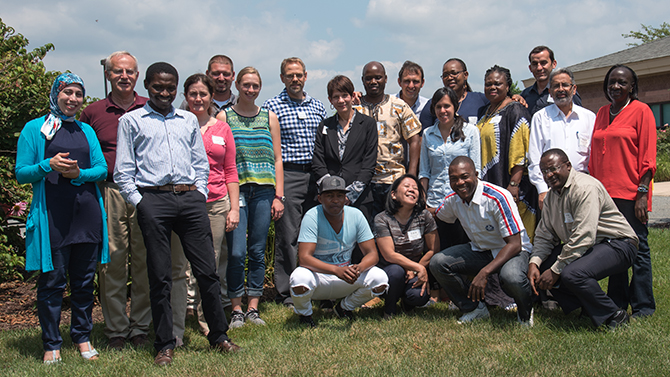


Quality assurance training
Photo by Juan Castellanos August 31, 2016
UD hosts participants for international veterinary diagnostic laboratory quality assurance certificate program
Thirteen participants from 10 countries spent a week recently at the University of Delaware’s College of Agriculture and Natural Resources as part of the 2016 Veterinary Diagnostic Laboratory Quality Assurance Training Program.
The program was hosted by UD’s Avian Biosciences Center (ABC) and led by Brian Ladman, scientist and quality manager for the University of Delaware Poultry Health System (UDPHS), part of the Department of Animal and Food Sciences, and Jack Gelb, professor in the Department of Animal and Food Sciences and the director of the ABC and UDPHS. It was sponsored by the International Technical and Regulatory Capacity Building Group at the United States Department of Agriculture’s (USDA) Animal and Plant Health Inspection Service (APHIS).
Ladman said the goal of the certificate program was to introduce the participants to the process of laboratory accreditation to the International Organization for Standardization (ISO) 17025 standard — a key for producers of agricultural commodities who are looking to export their products to countries throughout the world.
The ISO 17025 accreditation standard is used to prove the competence of testing and calibration in laboratories. A functioning laboratory quality management system is the foundation upon which accreditation is built. The technical (scientific) requirements are relatively easy for laboratories to meet, however, many of the quality management requirements are new to laboratories and their staff and require more effort to reach full compliance.
“ISO 17025 accreditation is achieved by having an auditor visit and review your laboratory and tell you that you’re meeting the required standard of work. They follow a specific checklist, the same one they are using to evaluate you, so there are no surprises. Laboratories have the opportunity to prepare for the review weeks in advance so the accreditation is very much a process of checking off the boxes and self-monitoring,” said Ladman. “ISO has many standards, if you will. Some are certifications that deal with manufacturing, like 9001. In our case, what we’re interested in is veterinary diagnostics, which falls under the 17025 standard.”
Ladman said the UDPHS works with the American Association for Laboratory Accreditation (A2LA) and started down the road to accreditation in 2010, becoming fully accredited by the association in July after three years of provisional membership status.
“The UDPHS, comprised of the Lasher Lab in Georgetown and the Charles C. Allen Laboratory in Newark, is now considered full members of A2LA, a requirement for performing USDA approved testing for diseases of poultry like highly pathogenic avian influenza,” said Ladman.
Having gone through the ISO 17025 accreditation audit allowed Ladman and the avian experts to talk to the Veterinary Diagnostic Laboratory Quality Assurance Training Program participants about the process and give them advice on what to look for when seeking an accrediting body with which to partner.
The participants came from countries in Africa and South America and took trips to places such as the Brandywine Zoo, which recently underwent their own audit by the Association of Zoos and Aquariums in May. In addition, they toured the Lasher Laboratory in Georgetown and explored Rehoboth Beach. For most participants, this was their first trip to the United States and the group visited the nation’s capital in Washington D.C., as well as New York City.
Participants also got to hear first-hand from an A2LA auditor about the process of an audit that could allow them to gain accreditation.
“What we were trying to do was show the participants the importance of accreditation,” said Ladman, who added that taking a program like this was a good first step. “An important part of the accreditation preparation is to go through a series of mock audits so the weaknesses in your system can be uncovered. You need some thick skin to take all of the constructive criticism as an audit without criticism is not a very good audit.”
Ladman said that in addition to learning about the auditing and accreditation process, the participants also got to meet one another and form lasting support networks.
“Although not fully accredited, the participants short term goal is to operate laboratories with the ISO 17025 standard in mind. Full accreditation is a longer term hope. What I hope they would do is leave with more quality system documents to improve their current system. More importantly, we’re creating a network of resources, people, for them to tap into to improve the quality management system and to get closer to full accreditation.”
Contact Us
Have a UDaily story idea?
Contact us at ocm@udel.edu
Members of the press
Contact us at 302-831-NEWS or visit the Media Relations website

